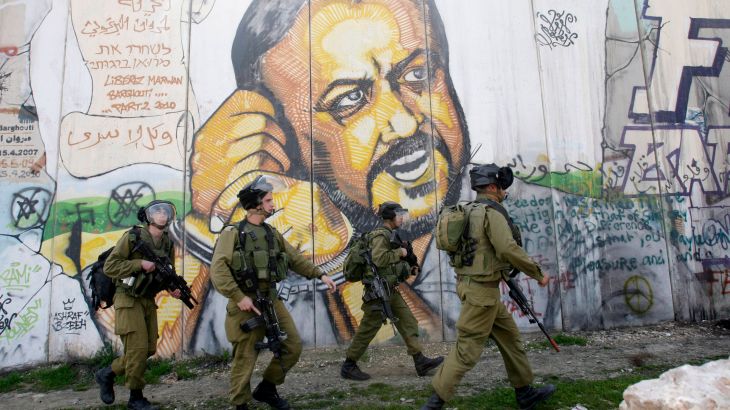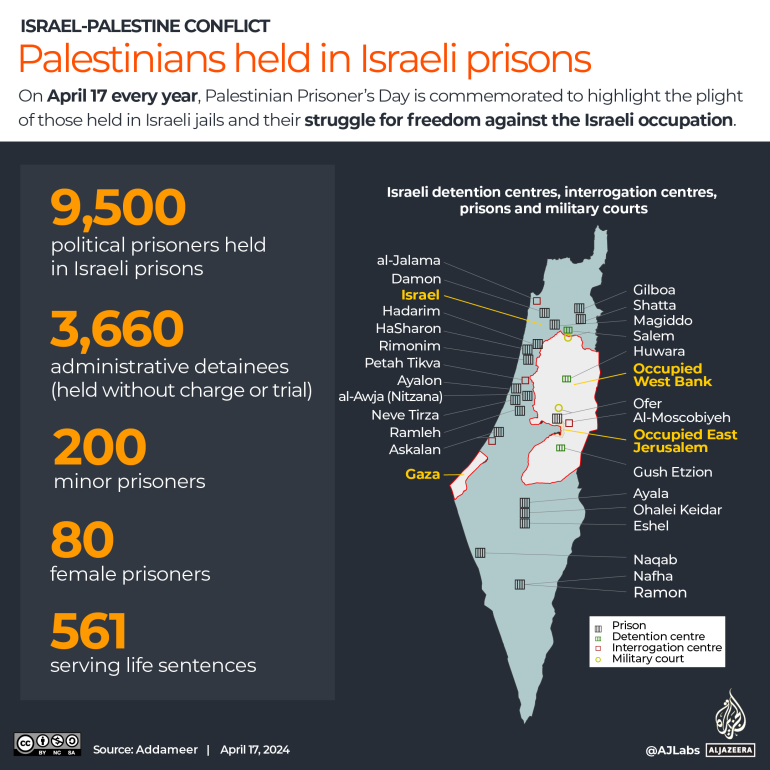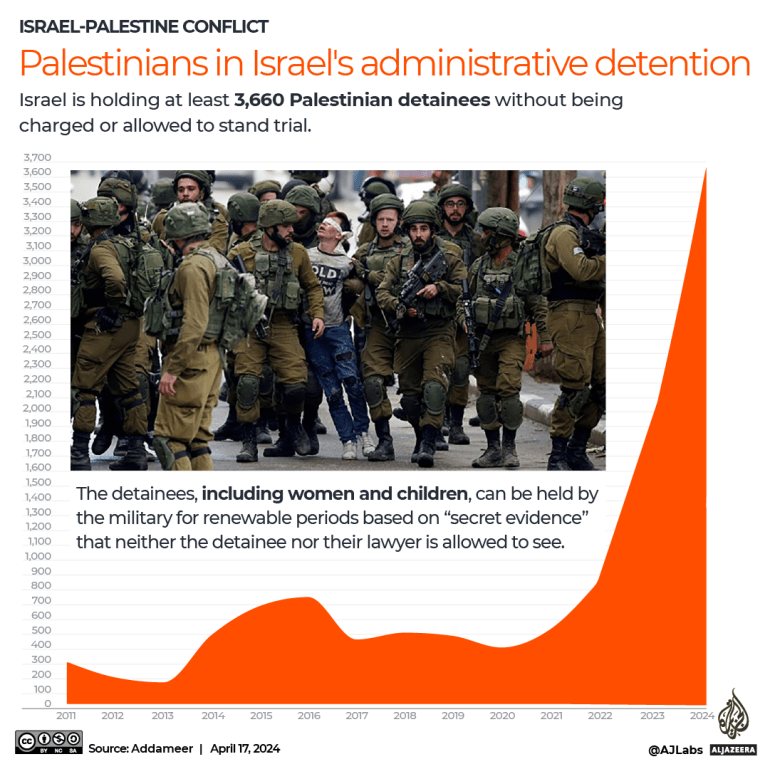Palestinian Prisoner’s Day: How many are still in Israeli detention?
Why are thousands of Palestinians being held in Israeli prisons without charge?

Every year, April 17 marks Palestinian Prisoner’s Day, a day dedicated to the thousands of Palestinian prisoners in Israel. Campaigners use the day to call for the human rights of such prisoners to be upheld and for those who have been detained without charge to be released.
On Monday, Israel released 150 Palestinian prisoners detained during the war in the Gaza Strip. These prisoners, including two Palestine Red Crescent Society workers, said they suffered abuse during their 50 days in Israeli prison, according to a report by the Reuters news agency.
Keep reading
list of 4 itemsJailed without charge: How Israel holds thousands of Palestinian prisoners
Anxious, optimistic: Families of female Palestinian prisoners await release
Freed Palestinian prisoners report physical abuse in Israeli jails
Here’s more about Palestinian Prisoner’s Day and the situation of the prisoners in Israel.
What is Palestinian Prisoner’s Day?
The Palestinian National Council chose April 17 as Palestinian Prisoner’s Day in 1974 because it was the date that Mahmoud Bakr Hijazi was released in the first prisoner exchange between Israel and Palestine in 1971.
Hijazi, who had been serving a 30-year prison sentence on charges of trying to blow up the Nehusha Water Institute in central Israel in 1965, was released by Israel in exchange for a 59-year-old Israeli guard named Shmuel Rozenvasser.
How many Palestinians are in Israeli prisons and how are they treated?
In the occupied Palestinian territories, one in every five Palestinians has been arrested and charged at some point. This rate is twice as high for Palestinian men as it is for women – two in every five men have been arrested and charged.
There are 19 prisons in Israel and one inside the occupied West Bank that hold Palestinian prisoners. Israel stopped allowing independent humanitarian organisations to visit Israeli prisons in October, so it is hard to know the numbers and conditions of people being held there.
As of Tuesday, about 9,500 Palestinians from Gaza and the West Bank were in Israeli captivity, according to estimates from Addameer Prisoner Support and Human Rights Association, a rights group based in the West Bank city of Ramallah that supports Palestinian prisoners. The organisation works with human rights groups and families of prisoners to gather information about the situation of the prisoners.
Palestinian prisoners who have been released have reported being beaten and humiliated before and after the start of the war on Gaza on October 7.
Prisoners released into Gaza on Monday have complained of ill-treatment in Israeli prisons, according to the Reuters report. Many of those released said they had been beaten while in custody and had not been provided with medical treatment.
“I went into jail with two legs, and I returned with one leg,” Sufian Abu Salah told Reuters by phone from a hospital in Gaza, adding that he had no medical history of chronic diseases.
“I had inflammations in my leg, and they [the Israelis] refused to take me to hospital. A week later, the inflammations spread and became gangrene. They took me to hospital where I had the surgery,” said Abu Salah, adding that he had also been beaten by his Israeli captors.
Permission for family members of prisoners to visit them has been suspended since the outbreak of COVID-19 in Gaza and since December 2020 in the West Bank, according to HaMoked, a human rights NGO assisting Palestinians subjected to human rights violations under the Israeli occupation. HaMoked added that minors being held in prisons were allowed a 10-minute phone call to their families once every two weeks during 2020.

How many Palestinian prisoners are being held without charge?
About 3,660 Palestinians being held in Israel are under administrative detention, according to Addameer. An administrative detainee is someone held in prison without charge or trial.
Neither the administrative detainees, who include women and children, nor their lawyers are allowed to see the “secret evidence” that Israeli forces say form the basis for their arrests. These people have been arrested by the military for renewable periods of time, meaning the arrest duration is indefinite and could last for many years. The administrative detainees include 41 children and 12 women, according to Addameer.

Why are Palestinian children held in Israeli prisons?
According to Addameer, 80 women and 200 children are currently being held in Israeli prisons.
In 2016, Israel introduced a new law allowing children between the ages of 12 and 14 to be held criminally responsible, meaning they can be tried in court as adults and be given prison sentences. Previously, only those 14 or older could be sentenced to prison. Prison sentences cannot begin until the child reaches the age of 14, however [PDF].
This new law, which was passed on August 2, 2016, by the Israeli Knesset, enables Israeli authorities “to imprison a minor convicted of serious crimes such as murder, attempted murder or manslaughter even if he or she is under the age of 14”, according to a Knesset statement at the time the law was introduced.
This change was made after Ahmed Manasra was arrested in 2015 in occupied East Jerusalem at the age of 13. He was charged with attempted murder and sentenced to 12 years in prison after the new law had come into effect and, crucially, after his 14th birthday. Later, his sentence was commuted to nine years on appeal.
What sort of trials do Palestinians receive?
Controversially, Palestinian prisoners are tried and sentenced in military courts rather than civil courts.
International law permits Israel to use military courts in the territory that it occupies.
A dual legal system exists in Palestine, under which Israeli settlers living in the West Bank and East Jerusalem are subject to Israeli civil law while Palestinians are subject to Israeli military law in military courts run by Israeli soldiers and officers.
How long have some Palestinians been in Israeli captivity?
Some Palestinian prisoners have been held in Israeli prisons for more than three decades.
These are people who were arrested before the Oslo Accords were signed in 1993 between then-Israeli Prime Minister Yitzakh Rabin, who was assassinated by an ultra-nationalist Israeli in 1995 who opposed the negotiations, and Yasser Arafat, the chairman of the Palestinian Liberation Organization. These pre-Oslo prisoners are called “deans of prisoners” by Palestinians, according to the website of Samidoun, an international network of organisers and activists advocating for Palestinian prisoners.
Al Jazeera could not independently verify the current number of pre-Oslo prisoners in Israeli prisons.
On April 7, the prominent Palestinian prisoner, activist and novelist Walid Daqqa died at Israel’s Shamir Medical Center. Daqqa had been arrested in 1968 for killing an Israeli soldier and remained in prison for 38 years before his death. He had been diagnosed with cancer in 2021. Despite pressure from rights groups to release Daqqa on medical grounds, Israel refused to free him.
Walid Daqqa,🇵🇸 prisoner battling cancer,has died in an Israeli Hosp. Despite international & Palestinian calls for his release due to severe medical neglect in prison, he remained detained until his death. Daqqa leaves behind a legacy as a 🇵🇸 hero, survived by his wife & daughter pic.twitter.com/liBBnFBVtM
— Lema (@Lemapal) April 7, 2024
Prominent Palestinian leader Marwan Barghouti – who was the co-founder of the Palestinian National Liberation Movement, also known as Fatah, the party that governs the West Bank – has been in prison for 22 years. In February, Israel’s far-right National Security Minister Itamar Ben-Gvir, announced that Barghouti had been placed in solitary confinement in February.